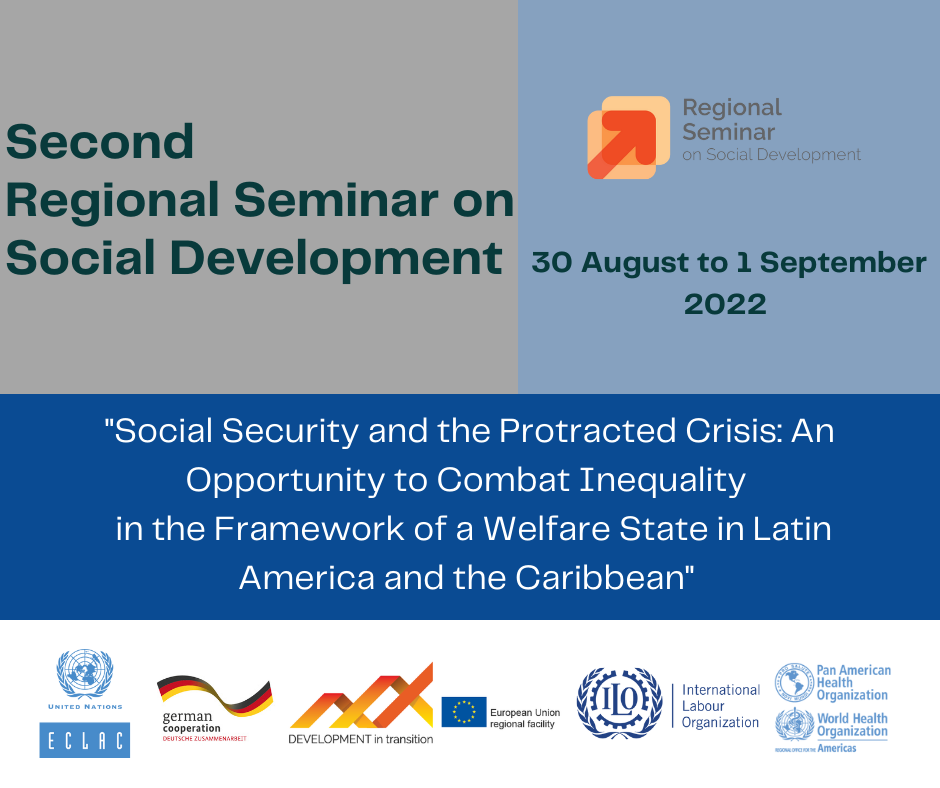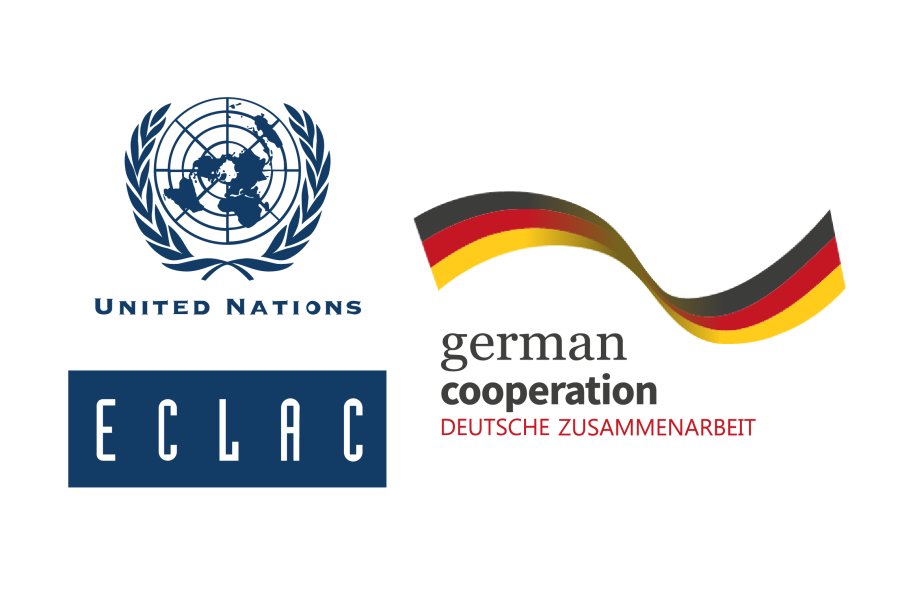Second Regional Seminar on Social Development: "Social Security and the Protracted Crisis: An Opportunity to Combat Inequality in the Framework of a Welfare State in Latin America and the Caribbean"
Work area(s)
Event information

Date
30 Aug - 01 Sep 2022, 10:00 - 12:50Event type
Participation
In the framework of collaboration with ILO and PAHO, and joint work with the German Cooperation and the European Union's Development Facility in Transition, ECLAC is organizing the Second Regional Seminar on Social Development, which this year aims to provide a space for dialogue and reflection on social security systems in the region. The seminar will focus on diagnoses, challenges and strategic orientations for reform and restructuring in pension and health systems in an uncertain context of recovery and the need to consolidate full guarantees for the exercise of social rights in the countries of the region.
Since 2020, the countries of the region have faced unprecedented challenges to respond through timely and relevant public initiatives to the impacts of the COVID-19 pandemic and to guarantee essential levels of well-being for citizens and access to health as a fundamental right and an essential public good. The scenario that has been faced has deepened structural factors that had been intensifying prior to the COVID-19 pandemic: high levels of informality, in a context of profound transformations in the face of ongoing technological changes, increasing poverty and a rapidly ageing population, among others. Although the measures implemented by the countries in the area of social protection have been substantial and have made it possible to mitigate, in part, the devastating social and economic effects of the pandemic, two years after it began, the living conditions of the region's inhabitants have deteriorated considerably. There is also evidence of the significant distance that exists in the region to consolidate true welfare states, with social security systems that guarantee equal access to benefits with adequate levels of coverage, sufficiency and financial sustainability. This can be seen in the marked increase in social inequality in its various expressions and in a 27-year setback in extreme poverty: in 2021, according to ECLAC projections, the extreme poverty rate would have reached 13.8% and the poverty rate would have reached 32.1% of the population. In addition, there has been a significant deterioration in the labour market, with a marked fall in labour participation, especially among women. This has led to an important drop in the proportion of people who are affiliated or contribute to health systems and to a decade-long decline in the effective coverage of pension systems, which in 2020 would have reached only 45% of the economically active population in 15 Latin American countries (ECLAC, 2022). There is also an increase in unmet health needs during the pandemic due to the exacerbation of access barriers (WHO, 2022).
Social security systems, and in particular pension and health systems, have been at the centre of attention. This has occurred in the face of the urgent need to strengthen the capacity of health systems to respond to an increase in the needs of the population in this area, with demand in many cases unsatisfied and unequally met, as well as in the context of debates on pension systems and the insufficiency of benefits to guarantee a dignified old age. Citizen demands for guaranteed access to these systems, sufficient benefits and greater equality have increased, with higher levels of fiscal pressure in line with the strengthening of public systems, universal scope and increasing coverage with comprehensive interventions in pension and health systems that respond to the needs of the population and ensure the adequacy of benefits in both systems. In this context, the need has arisen to move towards universal, progressive, solidarity-based and sustainable schemes in order to guarantee access and coverage for the entire population.
The pandemic has thus opened up a new scenario and possibilities for rethinking the architecture of welfare regimes in the region and the way in which old and new risks are redistributed. In the aftermath of the social and economic deterioration resulting from the COVID-19 pandemic, gaps and inequalities in access to key social protection instruments to protect against the risks of poverty, including access to pensions, health and unemployment insurance, have become more evident and, in several cases, have deepened. Rising levels of unemployment and labour informality are major barriers to the financial sustainability of social protection systems. In view of this, it is imperative to explore strategies to strengthen the institutional capacities of the State in order to advance towards comprehensive reforms in line with the principles of social security.
On the one hand, the COVID-19 pandemic has highlighted the importance of strengthening the coordination between health and social protection systems, as well as the structural weaknesses of health systems in Latin America and the Caribbean, with a strong impact on the health of vulnerable groups. Given this reality, it is necessary to deepen the development of public policies to restructure and strengthen the response capacity of health systems and move towards universal coverage and access, with timely and quality care for the entire population. This reflection should consider the need to increase investment in health through a sustainable increase in financing and a more efficient organisation of health services, with a strong emphasis on a first level of care strengthened in its capacity to resolve problems and with integrated and comprehensive models of care and attention, centered on people and communities, and with the capacity to address the social determinants of health.
In the case of pensions, these systems are a constitutive element of universal social protection systems and of countries' welfare architectures, and play a decisive role in the economic security of millions of elderly people. As ECLAC has indicated, it is essential to consolidate sustainable pension systems from a threefold perspective: coverage, sufficiency and financial sustainability, and that their design should take into account the principles of social security, including social solidarity and gender equality. Advancing in the articulation of the contributory and non-contributory components of these systems, as well as in mechanisms to universally guarantee basic benefit levels, with adherence to the set of social security principles, is a key challenge for the region, especially in view of the impacts produced as a result of the COVID-19 pandemic.
Programme of work
DAY 1
DAY 1
SOCIAL SECURITY AND WELFARE STATES
Presentation(s)
OPENING SESSION: Strengthening social security for today and tomorrow
OPENING SESSION: Strengthening social security for today and tomorrow
Moderator: Alberto Arenas de Mesa, Director of the Social Development Division, ECLAC
-
Mario Cimoli, ECLAC Acting Executive Secretary
-
Fabio Bertranou, Director of the ILO Office for the Southern Cone of Latin America
-
Carissa F. Etienne, Director, Pan American Health Organization
-
Volker Oel, Commissioner for Latin America, Federal Ministry for Economic Cooperation and Development (BMZ), Germany
-
Jutta Urpilainen, Commissioner for International Partnerships of the European Commission
PANEL 1 An opportunity for a strengthened welfare state in the region: towards building universal, comprehensive, resilient and sustainable social protection systems
PANEL 1 An opportunity for a strengthened welfare state in the region: towards building universal, comprehensive, resilient and sustainable social protection systems
Moderator: Fabio Bertranou, Director of the ILO Office for the Southern Cone of Latin America
Keynote presentation: Mario Cimoli, ECLAC Acting Executive Secretary (20 minutes)
Discussants:
-
Dean Jonas M.P., Minister of Social Transformation, Human Resource Development and the Blue Economy, Antigua and Barbuda
-
Maria Begoña Yarza, Minister of Health, Chile
-
José Carlos Cardona, Minister of the Social Development Secretary, Honduras
-
María del Rocío García Pérez, Undersecretary of the Ministry of Welfare, Mexico
-
Sonia Tarragona, Head of the Cabinet of Advisors Unit of the Ministry of Health, Argentina
Presentation(s)
DAY 2
DAY 2
PENSION SYSTEMS
Presentation(s)
KEY NOTE SPEAKER
KEY NOTE SPEAKER
"Strenghthening Welfare states and pension systems: the role of the State, solidarity and risk sharing"
Nicholas Barr, London School of Economics
Questions and answers
Moderator: Carlos Maldonado, Social Affairs Officer, Social Development Division, ECLAC
Presentation(s)
PANEL 2 Strategic orientations for pension reform debates in the region: moving forward with solidarity, equality and sustainability
PANEL 2 Strategic orientations for pension reform debates in the region: moving forward with solidarity, equality and sustainability
Moderator: Alberto Arenas de Mesa, Director, Social Development Division, ECLAC
Keynote presentation: Claudia Robles, Social Affairs Officer, Social Development Division, ECLAC (20 minutes)
Discussants:
-
Dr. Walter Borja Rojas, Head of the Social Security Office, Peru
-
Dr. Rolf Schmachtenberg, Permanent State Secretary, Federal Ministry of Labour and Social Affairs (BMAS), Germany
-
Paula Benavides, Executive President, Espacio Público
-
Helmut Schwarzer, Head of the Public Finance, Actuarial and Statistical Services Unit, Social Protection Department, ILO
Final reflections
PANEL 3 The challenges of reforming pension systems in the region and the new scenario in the wake of the pandemic
PANEL 3 The challenges of reforming pension systems in the region and the new scenario in the wake of the pandemic
Moderator: Rodrigo Martínez, Senior Social Affairs Officer, Social Development Division, ECLAC
Keynote presentation: Carmelo Mesa-Lago, Professor Emeritus University of Pittsburgh (30 minutes)
Discussants:
-
Sebastián Nieto Parra, Head of Latin America and the Caribbean, OECD Development Centre
-
Laura Ripani, Head of the Labour Markets Division, IDB
-
Camila Arza, Interdisciplinary Centre for the Study of Public Policy, Argentina
-
Ana Mohedano, Deputy Secretary General, Ibero-American Social Security Organisation
-
Mauricio Olivera, Administrative and Financial Vice President, Universidad de Los Andes, Colombia
Final reflections
Presentation(s)
DAY 3
DAY 3
HEALTH SYSTEMS
Presentation(s)
PANEL 4 Structural issues for health equity and COVID-19: the urgency of moving towards universal and resilient health systems
PANEL 4 Structural issues for health equity and COVID-19: the urgency of moving towards universal and resilient health systems
Moderator: Daniel Titelman, Director of the Economic Development Division, ECLAC
Keynote presentation: James Fitzgerald, Director of Health Systems and Services, PAHO (30 minutes)
Discussants:
-
Asa Christina Laurell, Director of Strategic Planning, IMSS, Mexico
-
Ligia Bahia, FIOCRUZ/UFRJ, Brazil
-
Vicente Ortún, Faculty of Economics, Pompeu Fabra University, Spain
-
Camilo Cid, Director of FONASA, Ministry of Health, Chile
Final reflections
Presentation(s)
PANEL 5 Strengthening social protection systems: the challenges of restructuring health systems in Latin America and the Caribbean
PANEL 5 Strengthening social protection systems: the challenges of restructuring health systems in Latin America and the Caribbean
Moderator: Simone Cecchini, Director of CELADE -Population and Development Division, ECLAC
Keynote presentation: Maria Luisa Marinho, Social Affairs Officer, ECLAC (20 minutes)
Discussants:
-
Álvaro Ramos, Executive President of the Costa Rican Social Security Fund
-
Miguel Fernández Galeano, Specialist in Health Services Administration, Faculty of Medicine, University of the Republic (UDELAR)
-
Ernesto Báscolo, Acting Head of the Health Services and Access Unit, PAHO
-
Bertha Luz Pineda Restrepo, Coordinator of Climate Change, Inequalities, Economy and Health, Andean Health Organization -Convenio Hipólito Unanue, Peru
-
Michele Gragnolati, Practice Manager for Health, Nutrition and Population Latin America and the Caribbean Region, World Bank
Final reflections
Presentation(s)
CLOSING SESSION: The opportunity to recover social security systems in a context of uncertainty
CLOSING SESSION: The opportunity to recover social security systems in a context of uncertainty
Moderator: Leonardo Ferreira, ILO Deputy Director for Central America, Haiti, Panama and the Dominican Republic
Alberto Arenas de Mesa, Director, Social Development Division, ECLAC
Felice Zaccheo Head of Unit for Mexico, Central America, Caribbean and Regional Operations (INTPA) of the European Commission
Manfred Häbig, Principal Advisor of the Cooperation Program ECLAC-BMZ/giz
Practical information
Virtual format.
Simultaneous interpretation Spanish-English-Spanish and sign language will be available.
